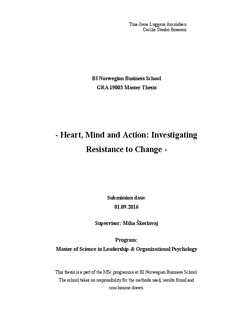| dc.description.abstract | Organizations are continually confronted with the need to implement
changes in order to compete, prosper and survive. Therefore, understanding what
makes a change implementation successful or not is crucial. This study
investigates the relationship between an individual’s internal inclination to resist
change and affective, behavior and cognitive resistance to change. We further
propose that this relationship is moderated by a relatively new concept, Perceived
Perspective Taking.
We distributed one web-based questionnaire to employees (n = 373) at a
large Scandinavian bank that had recently gone through a comprehensive office
move, which involved moving all employees into another building. The
employees also switched from designated working spaces, to open working spaces
with “first come, first serve” policy. Based on the valid responses obtained (n =
125), three hierarchical regression analyses were conducted. We found a direct
positive relationship from dispositional resistance to all three forms of resistance
to change. A moderating effect of perceived perspective taking was only found for
the relationship between dispositional resistance and cognitive resistance.
However, this effect was not sustained when controlling for trust and gender.
The results confirm Dispositional Resistance to Change as predictor of all
three dimensions of change, and thus also the view of resistance to change as a
tridimensional construct. Although no decisive effect was found from perceived
perspective taking, our research contributes to the exploration of a fairly new
concept in organizational research. In light of these findings we discuss theoretical
contributions, limitations, directions for future research and implication for
practice. | nb_NO |
